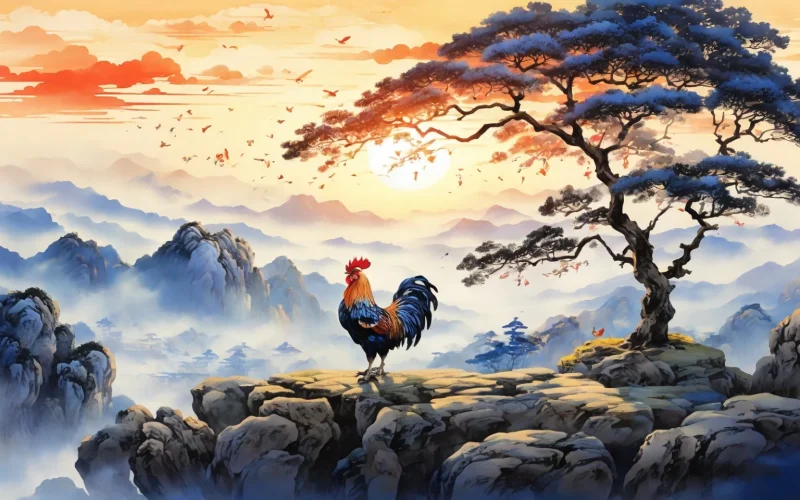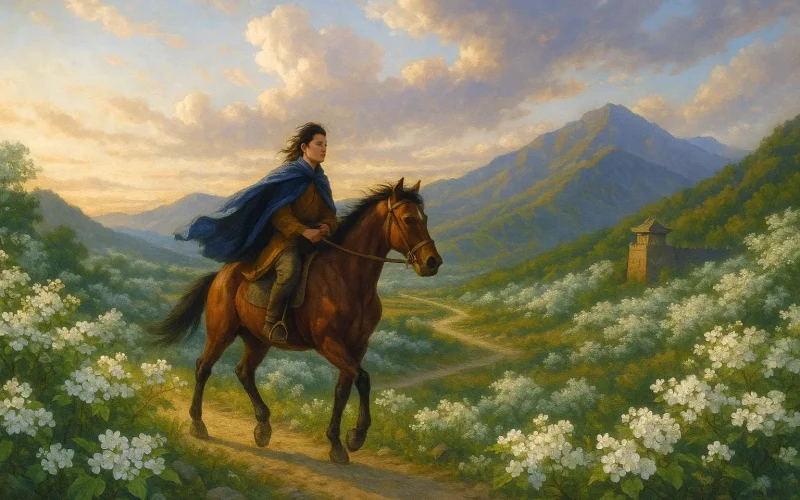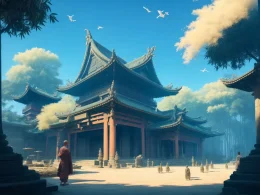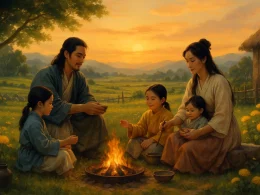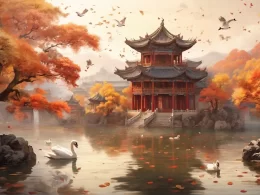Unsuccessful I stay but with a cup of wine;
The kind host wishes me to live to ninety-nine.
An ancient could not but stay in the west for long;
In vain his household waited with their willow song.
"A young talent often met with contemptuous eye,
Unknown on the old earth under the dreary sky.
You may write letters of two lines now and again,
And you may not court imperial favor in vain."
I would not call back my soul lost in a sad plight,
But when the cock crows, all the world will see daylight.
"While young, you should aim high and soar into the cloud.
Who pities a lonely man sobbing in the crowd?"
Original Poem:
「致酒行」
李贺
零落栖迟一杯酒,主人奉觞客长寿。
主父西游困不归,家人折断门前柳。
吾闻马周昔作新丰客,天荒地老无人识。
空将笺上两行书,直犯龙颜请恩泽。
我有迷魂招不得,雄鸡一声天下白。
少年心事当拏云,谁念幽寒坐呜呃。
Interpretation:
In the year 806, the young Li He harbored great ambitions and was preparing to take the imperial examination. However, due to a taboo on his father’s name, "Jinsu," he was disqualified from participating. This sudden setback left Li He deeply frustrated, and his life remained full of hardships. Yet, instead of succumbing to despair, he expressed his emotions through poetry. "Song of Offering Wine" was written during his time of confinement in Chang’an. Though tinged with sorrow, it conveys a profound vitality and a strong sense of self-motivation.
First Couple: "A weary traveler lingers over a cup of wine; the host offers a toast, wishing him a long life."
The opening lines introduce the poet as a wandering and destitute figure, subtly hinting at his feelings of helplessness. The host, through a gesture of offering wine and well-wishing, represents warmth and encouragement. This contrast between the poet’s plight and the host’s kindness sets the emotional tone of the poem.
Second Couple: "Lord Zhuofu traveled westward but never returned; his family, in sorrow, broke off willow branches before their door."
By referencing the story of Lord Zhuofu from the Han dynasty, who sought office but remained stranded in hardship, Li He draws a parallel to his own struggles. The image of family members breaking willow branches—a traditional symbol of farewell—evokes deep sorrow, emphasizing the pain of separation and unfulfilled ambitions.
Third Couple: "I heard that Ma Zhou once wandered as a guest in Xinfeng, lost in obscurity, unknown to the world."
This couplet recalls Ma Zhou, a Tang dynasty official who initially lived in poverty and was unrecognized for his talents. By invoking Ma Zhou’s eventual rise to prominence, Li He expresses his hope that he, too, may one day find his place in the world. This historical allusion injects a note of encouragement into the poem.
Fourth Couple: "With just a brief letter, he boldly addressed the emperor, earning royal favor."
Ma Zhou's story serves as a source of inspiration, reinforcing the idea that talent and perseverance can lead to recognition, even against all odds. Through the voice of the host, the poet hints at his own aspirations and determination to seek justice despite adversity.
Fifth Couple: "I was lost in confusion, unable to find my way—until a rooster’s crow awakened the world at dawn."
The poet uses the metaphor of a "lost soul" to describe his past state of uncertainty and despair. The crowing rooster symbolizes sudden enlightenment, marking a turning point where hope and clarity emerge. This striking imagery imbues the poem with a sense of renewal and awakening.
Sixth Couple: "A young man’s ambitions should reach the clouds; why sit in bitter solitude, lamenting the cold?"
The final lines deliver a powerful statement of ambition. The poet rebukes self-pity, urging himself to strive for greatness rather than resigning to misfortune. This concluding sentiment embodies a spirit of resilience and determination.
Writing Style:
- Well-Structured with Emotional Progression – The poem moves through distinct phases: from sorrow to reflection, then to motivation and empowerment, creating a dynamic emotional arc.
- Skillful Use of Historical Allusions – By referencing past figures like Zhuofu and Ma Zhou, Li He strengthens his message, drawing wisdom from history to inspire himself.
- Vivid and Unique Imagery – Expressions such as “the rooster’s crow awakening the world” and “lamenting in cold solitude” enrich the poem’s depth and poetic quality.
- Dialogue Format Enhancing Dramatic Effect – The exchange between the host and the guest adds an engaging theatrical element, making the poem feel more interactive and immersive.
Overall Appreciation:
"Song of Offering Wine" is a deeply personal yet universally resonant poem. Through the host’s encouragement and historical allusions, the poet weaves a narrative that transforms personal despair into resilience. The shifting tone—from sorrow to determination—mirrors the poet’s internal struggle and ultimate self-motivation. Li He’s distinct poetic style, rich with symbolic imagery and historical depth, makes this poem both emotionally compelling and intellectually stimulating.
Insights:
This poem offers a profound reflection on perseverance in the face of adversity. Li He reminds us that while hardships and setbacks may seem insurmountable, history proves that talent and persistence can ultimately lead to recognition. Through the metaphor of the rooster’s crow dispelling darkness, the poem encourages us to rise above self-doubt and seize our destiny. It serves as a timeless inspiration for those navigating difficult times, urging them to embrace ambition and never surrender to despair.
Poem translator:
Xu Yuan-chong (许渊冲)
About the poet:
Li He (李贺), circa 790 - 817, was a native of Luoyang, Henan Province, and a Romantic poet of the Middle Tang Dynasty.





